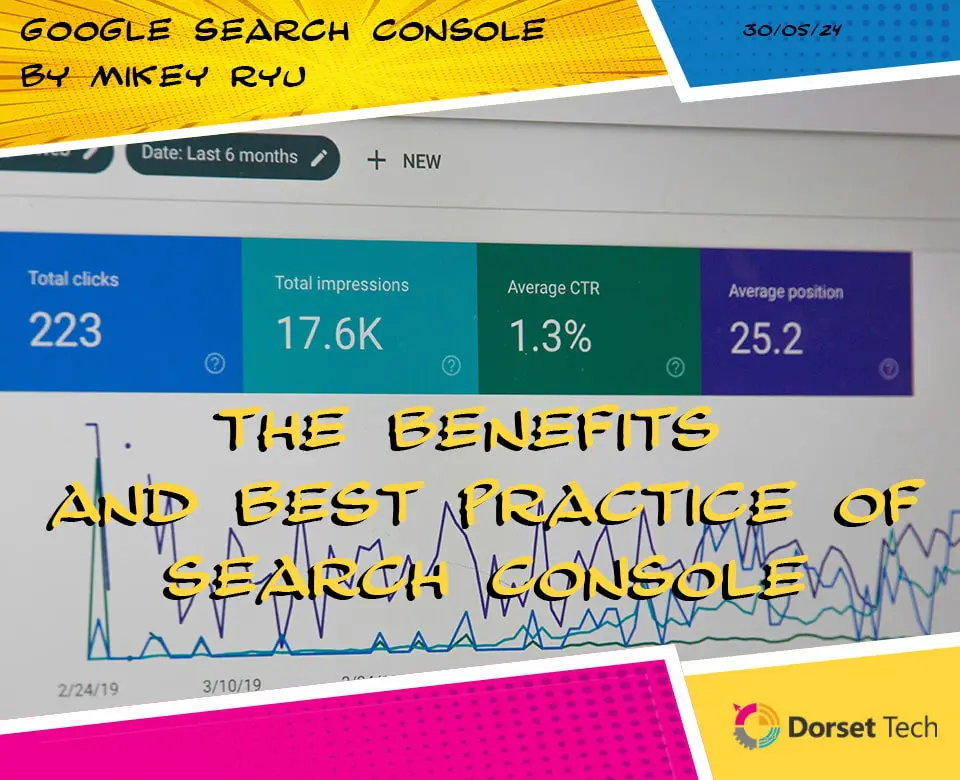
Google Analytics Vs Google Search Console
Unveiling Google Analytics: Unleashing the Power of Data-Driven Insights
In the modern digital landscape, where businesses and individuals are intricately connected through the World Wide Web, understanding the nuances of user behaviour, website performance, and online trends has become paramount. Enter Google Analytics, a robust and powerful tool that has transformed the way we gather and analyse data related to online activities. In this blog, we’ll delve into what Google Analytics is, its myriad benefits, and how it empowers businesses to make informed decisions in a data-driven world.
Understanding Google Analytics
At its core, Google Analytics is a web analytics service developed by Google that allows website owners, marketers, and businesses to track, analyse, and interpret various aspects of their online presence. This encompassing tool provides detailed insights into user engagement, website traffic, and the effectiveness of online marketing efforts.
The Benefits of Google Analytics
1. In-Depth Website Analysis
Google Analytics provides a comprehensive overview of how users interact with your website. It reveals critical metrics such as the number of visitors, page views, bounce rates, and session durations. This information enables you to understand which pages are performing well and which ones might need optimization.
2. User Behaviour Insights
One of the standout features of Google Analytics is its ability to track user behaviour. You can determine the paths users take through your website, which pages they visit most frequently, and where they drop off. This granular insight allows you to optimize the user experience, identify conversion bottlenecks, and tailor your content to align with user preferences.
3. Conversion Tracking
For businesses, tracking conversions is crucial. Google Analytics lets you set up goals, such as completing a purchase or signing up for a newsletter. It then provides data on how well your website is converting visitors into customers, enabling you to refine your strategies and boost your bottom line.
4. Traffic Sources and Campaign Analysis
Understanding where your website traffic comes from is paramount in today’s digital marketing landscape. Google Analytics breaks down your traffic sources, including organic search, direct visits, referrals, and social media. This data empowers you to assess the effectiveness of different marketing campaigns and allocate resources accordingly.
5. Real-Time Monitoring
With Google Analytics, you can monitor your website’s performance in real-time. This feature proves invaluable during marketing campaigns, product launches, or when tracking sudden spikes in traffic. Real-time data allows you to respond promptly to emerging trends or issues, enhancing your agility in the digital realm.
6. Customizable Reporting
Google Analytics offers a plethora of pre-designed reports that provide insights into various aspects of your website’s performance. Additionally, the platform allows you to create customized reports tailored to your unique needs. This flexibility ensures that you’re able to extract the precise data that matters most to your business goals.
7. Mobile App Analytics
In the age of mobile dominance, Google Analytics extends its reach to mobile apps as well. You can gain insights into user engagement, retention rates, and the effectiveness of your app’s features. This holistic view helps app developers enhance user experiences and optimize app performance.
How Google Analytics Works
Google Analytics operates by embedding a tracking code into your website’s HTML. This code collects data as users interact with your website, capturing information such as the pages they visit, the actions they take, and the devices they use. This data is then sent to Google’s servers and processed into comprehensible reports accessible via your Google Analytics dashboard.
The tracking code uses cookies to identify unique users and track their journey across your website. These cookies record valuable information like session duration, user demographics, and interactions with specific content. However, it’s essential to note that privacy concerns have prompted Google to update its data retention policies and provide options for users to control their data.
The Google search console side of things
Unwrapping Google Search Console: Navigating the Path to Search Visibility and Website Excellence
In an era dominated by online searches, where digital footprints can make or break businesses, having a comprehensive understanding of your website’s performance in search engines is essential. Enter Google Search Console, a vital tool designed to empower website owners, marketers, and SEO professionals with insights into their site’s presence on Google. In this blog, we’ll dive into the world of Google Search Console, explore its benefits, and learn how it helps optimize websites for search success.
Deciphering Google Search Console
Google Search Console, formerly known as Google Webmaster Tools, is a free web service provided by Google. Its primary objective is to help website owners monitor and maintain the presence of their sites in Google Search results. From indexing issues to search performance, this tool provides valuable data and insights necessary for a successful online presence.
The Advantages of Google Search Console
1. Indexing Insights
A cornerstone feature of Google Search Console is the ability to monitor how Google indexes your website. It informs you which pages of your site have been successfully indexed, along with any indexing errors that might hinder your site’s visibility on search engines.
2. Search Performance Analysis
Google Search Console offers detailed information about how your website performs in search engine results. You can explore data about the search queries that led users to your site, the click-through rates, and the average position of your pages in search results. This data is invaluable for refining your content and SEO strategies.
3. Website Errors Identification
Search Console identifies potential issues affecting your site’s performance, such as crawl errors, broken links, and mobile usability problems. By addressing these issues promptly, you can ensure a smoother user experience and enhance your website’s search ranking.
4. Sitemap Submission
Submitting your website’s sitemap to Google Search Console helps search engines understand the structure of your site. This enables search engines to index your pages more effectively and improves your site’s overall search visibility.
5. Rich Results and Enhancements
Google Search Console provides insights into the appearance of your website’s pages in search results. You can monitor the presence of rich results, such as snippets, breadcrumbs, and other enhancements that make your listing more engaging and informative for users.
6. Mobile Usability Analysis
With the rise of mobile usage, Google Search Console helps you assess the mobile-friendliness of your website. It identifies issues that might affect how your site performs on mobile devices and offers suggestions to improve the mobile user experience.
7. Security and Manual Actions
Search Console alerts you if your site has been compromised or hacked. Additionally, it notifies you about any manual actions taken against your site by Google due to violations of their quality guidelines. Staying on top of these issues is crucial for maintaining your site’s reputation and search ranking.
But why not Both?
In the ever-evolving realm of online presence, data reigns supreme. To truly understand your website’s performance and maximize its potential, utilizing both Google Analytics and Google Search Console is a strategic move that can yield transformative results. These two powerful tools, each with its distinct strengths, when used in tandem, create a synergy that empowers businesses to navigate the digital landscape with unparalleled precision. Let’s delve into how the combined might of Google Analytics and Google Search Console can elevate your digital strategy.
Holistic Insights into User Behaviour
Google Analytics shines a light on the user journey within your website. It reveals pages they visit, actions they take, and their overall behaviour. On the other hand, Google Search Console delves into how your website performs on search engines, providing data on search queries that led users to your site, click-through rates, and average search result positions.
By combining insights from both platforms, you gain a comprehensive view of user behavior, from discovery to interaction. For instance, you can correlate high-performing pages in Google Analytics with the search queries that drive traffic to those pages in Search Console. This cross-referencing aids in understanding the user intent, enabling you to tailor your content and optimize conversion paths accordingly.
Refined SEO Strategies
Google Search Console is your compass for SEO excellence, highlighting areas for improvement and opportunities to enhance your website’s search visibility. It identifies crawl errors, mobile usability issues, and provides insights into your website’s indexing status. When paired with Google Analytics, you can measure the impact of your SEO efforts on user engagement and conversion rates.
For instance, you might discover that users from organic search traffic have higher engagement rates on specific landing pages. By understanding these correlations, you can fine-tune your SEO strategies to not only drive traffic but also enhance user experiences and boost conversions.
Enhanced Content Performance
Content marketing is a cornerstone of online success, and the combination of Google Analytics and Google Search Console offers invaluable insights into your content’s reach and impact. Google Analytics tracks how users engage with your content, from time spent on pages to social shares. Meanwhile, Google Search Console provides data on the search queries that lead users to your content.
By aligning these insights, you can identify the most effective content in terms of engagement and search performance. This synergy aids in crafting content strategies that cater to your audience’s interests while capitalizing on search trends.
Conversion Optimization
Google Analytics excels at tracking conversions, be it sales, sign-ups, or other goals. Google Search Console contributes by offering insights into the search queries that drive users to specific conversion-oriented pages. By combining data from both platforms, you can uncover the keywords that have the highest conversion rates.
Understanding which keywords lead to conversions allows you to refine your SEO strategy, ensuring your content is optimized for those keywords and maximizing the chances of attracting qualified leads.
Agile Decision Making
The real-time monitoring capabilities of both tools enable agile decision-making in response to emerging trends and issues. Google Analytics’ real-time data reveals sudden traffic spikes, while Google Search Console’s alert system notifies you of indexing issues or manual actions taken against your site. By leveraging these insights collectively, you can promptly adapt your strategies and mitigate potential challenges.
Optimal User Experience
At the heart of every successful digital venture is a seamless user experience. Google Search Console’s mobile usability insights combined with Google Analytics’ data on user behaviour across devices allow you to pinpoint areas where user experience might be compromised. By addressing these issues, you ensure that users have a smooth, engaging, and conversion-friendly journey, enhancing your website’s overall performance.
In Conclusion
The synergy between Google Analytics and Google Search Console transcends individual data points, forming a cohesive narrative of your website’s digital journey. These tools, when utilized together, provide a holistic understanding of user behaviour, content efficacy, SEO strategies, and more. This united approach equips you with the knowledge needed to make informed decisions, optimize your digital presence, and stay ahead in the competitive online landscape.





















